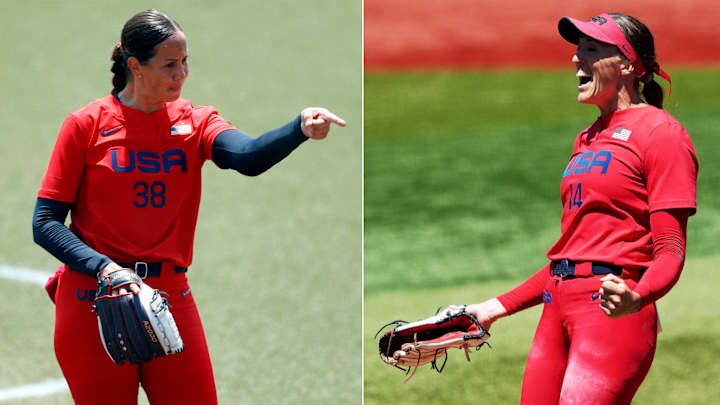Fire & Ice: Monica Abbott and Cat Osterman Are Leading Team USA's Push for Gold

TOKYO — The first hug was spontaneous. Cat Osterman had pitched six shutout innings in Team USA’s first Olympic softball game in 13 years, and Monica Abbott had struck out the side to beat Italy 2–0. They saw each other in the handshake line after the game and embraced.
Abbott found Osterman after the second game, a 2–0 win over Canada, and grabbed her again. By the time they beat Mexico 2–0, Australia 2–1 and Japan 2–1, it had become tradition: One or both of them would fire a dominant pitching performance, then they would hug.
“It’s kind of been our thing here at the Olympics,” Osterman says. “We keep winning, so we’ll just keep hugging.”
Between them, they have pitched all but 5 1/3 innings of Team USA’s Olympics. They have yet to allow an earned run.
Their next opportunity will come Tuesday at 7 a.m. ET, when they face Japan in the gold medal game. The last time these two teams met in a gold medal game came in 2008. The U.S. had won all the previous golds, but Japan won that one, 3–1.
Abbott and Osterman pitched in that game. Softball was dropped from the Olympic program after 2008, so they weren’t sure they’d ever be back. They might not be, if not for each other.
They are such legends that at first, coach Ken Eriksen wasn’t sure he wanted them on the team. Abbott, who turns 36 on Wednesday, is the NCAA Division I leader in wins, strikeouts, shutouts and innings pitched; a seven-time professional champion; and a five-time world champion. Osterman, 38, is a three-time National Player of the Year; a four-time pro champion; and an Olympic gold medalist, from 2004. Many of the younger players had grown up with Abbott and Osterman posters in their bedrooms, and Eriksen feared that they might be too starstruck to play as a team. Besides, he had already constructed a strong squad with its own identity, and as he looked to fortify it in '18, he worried that they might disrupt that chemistry.
So before he recruited them, he took their temperature—and found that it matched his. “I thought it was a tremendously mature, adult thing,” he says. “They felt that [if] they tried to fit in, instead of saying, ‘Hey, this is what we did,’ that it would be [a] better dynamic, and it is, and I give them both credit for doing it.”
They had both taken time away from the national team after 2008 to focus on their professional careers. They were rivals in National Pro Fastpitch until Abbott signed with the Red Terriers of the Japan Softball League in ’10. In ’15, Osterman retired—much to Abbott’s chagrin.
“You’re too young!” Abbott would insist. “You still have a lot of strikes left in you.”
“I was tired,” Osterman says now. “I needed some time.” But softball was returning to the Olympics, and eventually she decided she was ready to consider joining it. She called Abbott. “She was all for it,” says Osterman. So she signed on.
Most of their teammates are in their 20s. “There’s definitely an age gap,” Abbott says. “I think I help bridge that for Cat.”
Osterman laughs at this. “She acts like she likes to bridge the gap, like she’s way younger than I am,” she says. “She’s an old lady, too.”
Their age is one of the few things they have in common. They are both lefthanded pitchers. They are both tall. That’s about it.
“I throw hard; she throws slow,” Abbott says. “I throw up in the zone; she throws down in the zone. Even personality-wise, I think we're pretty opposite.”
“She’s like your data spreadsheet and I’m like your abstract art,” Osterman says.
Put another way, Abbott is fire and Osterman is ice. Shortly before the pandemic started, they settled on that terminology and have been delighting in the implications. When the players need energy, Osterman will call on Abbott to pump them up. When they need to focus, Abbott will enlist Osterman.
“They’ve kind of melded into one tremendous leader,” Eriksen says.
Their teammates show their appreciation by trying to score runs for them. They also made T-shirts: FIRE & ICE, they say. On the left is Abbott in red, throwing a flaming softball; on the right is Osterman in blue, throwing a frozen one.
“It's been a really fun journey to just have her with me,” Osterman says. That journey will end Tuesday. Win or lose, afterward, they will hug.
More Olympics Coverage:
• Osterman Brings More Than Just Leadership to U.S. Olympic Softball Team
• Biles and U.S. Women's Gymnastics Team Stumble in Qualifiers
• Naomi Osaka Returns to Tennis—and the World Stage—in Tokyo
• Chase Kalisz, Jay Litherland Set Off a Tidal Wave of Medals for U.S. Swimming
• USA Basketball's Loss to France Reveals Roadblocks to Gold

Stephanie Apstein is a senior writer covering baseball and Olympic sports for Sports Illustrated, where she started as an intern in 2011. She has covered 10 World Series and three Olympics, and is a frequent contributor to SportsNet New York's Baseball Night in New York. Apstein has twice won top honors from the Associated Press Sports Editors, and her work has been included in the Best American Sports Writing book series. A member of the Baseball Writers Association of America who serves as its New York chapter vice chair, she graduated from Trinity College with a bachelor's in French and Italian, and has a master's in journalism from Columbia University.
Follow stephapstein